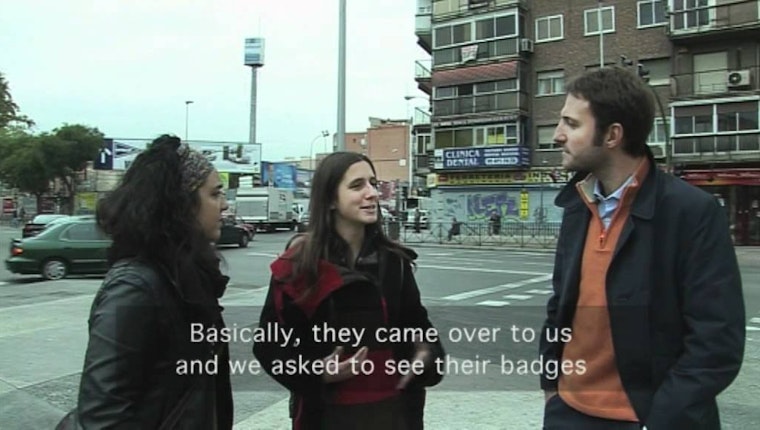New Report Tells Spain to "Stop Racism, Not People"
By Rachel Neild

A new report by Amnesty International exposes the prevalence of racial profiling in Spain. Stop racism, not people: Racial profiling and immigration control in Spain paints a powerful portrait of the indignities suffered by those who do not “look Spanish” and of the official policies that encourage rather than curtail ethnic profiling.
The report finds that non-white people in Spain—be they undocumented migrants, legal residents, or long-standing Spanish citizens—report being stopped by police, sometimes several times a day, sometimes for extended identity checks, and sometimes detained while their immigration status is checked. Amnesty notes that police in Madrid were given targets with specific numbers of migrants they were to stop and ordered to find undocumented migrants to deport. Indeed, the orders went further and prioritized Moroccans because who are easy and cheap to deport from Spain to neighboring Morocco, while plane seats for Bolivian deportees were expensive and rare.
This blatant ethnic profiling is far from new in Spain, nor is it restricted to Spain. In France, for example, officials lamented just missing their target of deporting 25,000 undocumented migrants in 2007, but upped their ambitions to a target of 28,000 in 2010.
And how are the deportees to be found? In Spain, France, and other countries where these policies are pursued, the primary means is the police ID check. Police go to locations where they expect to find migrants—often metro stations, internet and call shops, neighborhoods with large migrant populations, and then they look for people who “don’t look French, or Spanish.” Inevitably, police rely on racial or ethnic appearance and racial profiling. The policies do lead to the detection of some undocumented migrants, but they do so at a tremendous cost, albeit a cost that is often not very visible to the majority.
Europe’s majority populations rarely experience police stops, and tend to view these incidents as minor. The reasoning goes: “They just stop you and look at your papers. If you’ve done nothing, you have nothing to fear. You’ll be on your way in a minute or two. It’s just an inconvenience.” The Amnesty report clearly shows that ethnic profiling in police ID checks causes significant harm. A legal migrant describes being stopped repeatedly, even in a single day, saying: “When I’m on the way to work I’m in a hurry, but they don’t care, they check [my documents] anyway. Being stopped like this makes me feel very bad, like I’m not free.”
Other migrants described being told to integrate, but then find themselves singled out for police checks. Because bystanders assume anyone stopped must have done something to warrant the attention, the practice also reinforces stereotypes about migrant criminals. In the words of another legal migrant: “They say they are looking for criminals. But being black isn’t being a criminal. They select races; while there are criminals from all groups.”
What is striking and unusual in Spain is that the Constitutional Court has ruled that racial profiling in immigration stops is lawful. In 1992, Rosalind Williams, a naturalized Spanish citizen of African-American origin, was told by an officer who singled her out for an ID check that he did so because she was black. After an extended legal battle, in 2001, the Spanish Court upheld racial appearance as a valid ground for immigration stops—a ruling Spanish police officers have repeatedly cited to the Justice Initiative in our discussions of profiling. Only one judge dissented, opining that this violated Spain’s constitutional guarantees of equal treatment; would impede integration; and could lead to discrimination against Spanish nationals of minority ethnic origin—a group that is growing rapidly as Spain’s demographics reflect an increasingly diverse population.
The Open Society Justice Initiative, with Women’s Link Worldwide, took Rosalind’s case to the United Nations Human Rights Committee, which, in June 2009, found Spain to be in contravention of its treaty obligations to respect equal treatment. The committee called on Spain to change the law, make a public apology to Rosalind Williams, and "take all necessary measures to prevent its officials from committing acts as in the present case."
The Spanish government did apologize to Rosalind in a private meeting. But they made no public apology; paid no reparation; and have instituted no measures to prevent the recurrence of this practice. They have argued that it is no longer a problem and that changes in police training on rights and diversity introduced since 2001 provide adequate guarantees.
As Stop racism, not people shows, this is blatantly false. Not only has the government ordered police to identify undocumented migrants in a fashion that clearly drives ethnic profiling, but analysis of police training carried out by Amnesty International found no guidance on equal treatment and human rights. Indeed, a police union official told Amnesty that an officer receives no training on identity checks and is told that “when he is in the street he can identify whoever he wants whenever he feels like it.”
Spain is derelict in these matters. But it is not for want of know-how. The Justice Initiative has partnered with municipal police in Spain to introduce ways to track and monitor stops and make sure they are fair and effective. In Fuenlabrada, a Madrid suburb, the STEPSS project reduced the number of stops that police made, but dramatically increased their effectiveness—that is, how often a stop actually detected a crime or infraction. Most importantly, it reduced the rate at which minorities were stopped, and supported new dialogue between the police and diverse local communities, providing them with better information on local problems and new avenues to find solutions.
In part building on this experience, a new coalition called the Platform for Police Management of Diversity is bringing together leading Spanish equality and anti-racism NGOs and the association of chiefs of Spain’s municipal police to promote and recognize good practice. In 2012, they will award the first prizes for good practice in police diverse communities.
It is time the national government and national police forces—the Policía Nacional and the Guardia Civil—see the light and end their denial. Ethnic profiling is illegal discrimination. It is also inefficient policing. And local models exist for remedies. All that is lacking is the political will. The new government of Prime Minister Mariano Rajoy takes office next week, on December 22. He and his new Interior Minister should take a little time over the holiday break to read Amnesty’s report and then take action in the new year.

Until November 2021, Rachel Neild was a senior program advisor for the Open Society Justice Initiative.